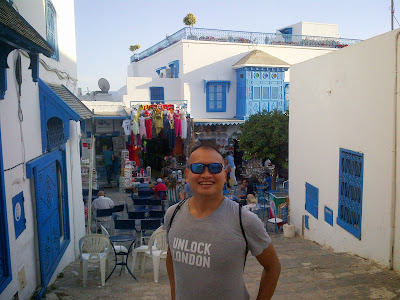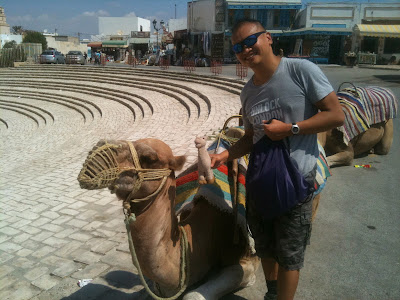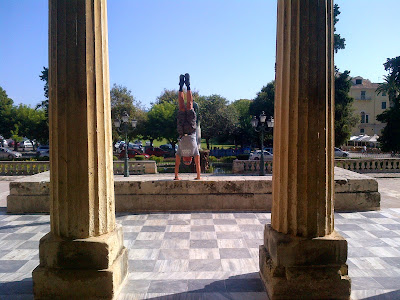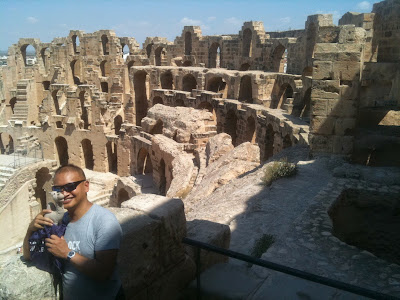Hello everyone. As I listened to the news today on the radio, two stories made the headlines: firstly, there is the ongoing economic crisis in Greece and then there are reports on the recent Tunisian terrorist attack in Sousse. Having visited both countries last summer for my summer holidays, I am of course very saddened by the terrible news from Tunisia because I actually rather enjoyed my visit there – okay, it was the kind of eye-opening holiday to North Africa but nonetheless, it was exotic and interesting enough. So in today’s blog post, I shall deal with some Q&As in light of the current situation in Greece and Tunisia.
 |
|
That’s me in Sousse last year, 2014 |
Q: Is it safe to visit Tunisia now?
A: Well, that is a very difficult question to answer. One would have imagined that after the horrific attack at the Bardo Museum earlier this year that security would be beefed up, but the terrorist attack happened on a beach at a hotel. It is nearly impossible to have armed security protecting tourists in every single hotel and tourist attraction in a country as big as Tunisia. After the Bardo Museum attack, many tourists were reluctant to leave their five star resort hotels but this attack was precisely on one such hotel in Sousse, it was designed to damage the tourism industry and scare tourists away. So whilst I wouldn’t want to say “don’t visit Tunisia now”, I would say that you should exercise extreme caution when visiting Tunisia and ideally, you (or at least someone in your party) should fulfill the following criteria:
- you speak some French and a little Arabic
- you are experienced in traveling around the Middle East
- this is not your first trip to North Africa
If you are able to tick all three boxes above, then you would be able to know what to do to protect yourself should any kind of trouble kick off. There have been so many amazing stories of Tunisians who went out of their way to help protect the foreign tourists when the terrorist attack happened and a key thing you should at least be able to do is to ask for help or respond to an offer for help in a case of an emergency. The number of Tunisians who speak any English at all is still quite low – the two main languages used in the country are Arabic and French (as Tunisia was an ex-French colony).
 |
|
I was impressed by Tunisia indeed. |
Q: Is it really that important to be able to speak the local languages? Why?
A: So imagine this situation: you’re exploring the charming old Medina of Tunis when suddenly there is a commotion down the street followed by an explosion and many people coming running your way, screaming and looking extremely frightened. You have no idea what is going on – one man stops to tell you what is going on, but he is speaking first in Arabic and when you don’t understand, he switches to French. It is clear that he does not speak any English: but he could be giving you vital information about what has just happened and what you must do to get to safety. Of course, one prays that one never finds oneself in such a scary situation – but being able to communicate at some level with the locals is vital in such situations. Remember, the locals are usually friendly and helpful, but that doesn’t mean that they speak any English!
 |
|
Tunisia can be very, very hot in the summer. |
Q: Will it ever be safe to visit Tunisia again? If so, when?
A: Yes is the simple answer. The two major terrorist incidents this year were not the first terrorist incidents targeting foreign tourists in Tunisia – back in 2002, there was a horrific attack targeting tourists in the town on Djerba where 19 people were killed. Yes people were horrified and frightened for a while but the tourists did return to Tunisia pretty soon after that, undeterred by the memories of what happened in Djerba. I don’t know why people have such short memories, maybe they were tempted by cheap bargains. But so much depends on what else happens this summer – if there isn’t another terrorist attack targeting tourists in Tunisia this summer, then people will start to feel confident that it is safe to visit Tunisia again. Let’s see – the tourists will return in due course, though it may take a year or two.
 |
|
And that’s me in Corfu last year as well! |
Q: How did things get this bad – the Greek crisis is nothing new, it has been going on for years already, so why did the banks suddenly close this week, leaving millions of Greeks wondering if they will ever get their life savings out?
A: This is because Greece’s current bailout has expired on the 30 June 2015 and in order to continue receiving more help from the IMF, it had to repay €1.6bn (£1.1bn; US$1.8bn) to the IMF which they have failed to. This moves the Greek crisis to a whole new level where the reality of the Grexit (Greece leaving the Euro) becomes ever more of a reality. There will be a referendum on the 5 July for the Greek people whether or not to accept the bailout’s conditions (which will mean more austerity to satisfy the creditors, in order to get more help and bailout money). If the Greek people vote no (ie. “no we will not accept these conditions, the IMF, the ECB and EU can go f#ck themselves”) then it will almost certainly mean that Greece will leave the EU, the assets in the banks will be converted back to Greek Drachmas (ie. the old currency Greece used before adopting the Euro) and it will almost certainly be at a very, very poor exchange rate, making the new Greek Drachma a very weak currency. Either way the Greek people vote on 5 July, both options will come with a lot of pain for ordinary Greek folks.
Q: I heard that the 60 euros a day withdrawal limits apply only to Greek bank cards and that if I show up in Athens tomorrow with a non-Greek bank card, I should in principle, be able to withdraw a lot more than 60 euros a day, is that correct?
 |
|
Crisis or not, Greece is still beautiful! |
A: Not really. In principle, yes, as you said, the limits should only apply to Greek bank card holders but in reality, what has happen is that so many Greeks have been queuing up at every ATM, trying desperately to withdraw as much cash as possible as they fear a messy exit from the euro would mean their life savings losing a lot of value overnight. So they would rather keep their euros in a biscuit tin under their beds or stuffed in frozen chickens in their freezers, What that means is that even if you can find an ATM, either you have to queue for hours to use it (not very practical if you’re on holiday) or the ATM would have run out of cash by the time you get to the front of that queue. What many tourists have resorted to doing is bringing several hundreds, even thousands of euros with them in cash when going to Greece in the last few days.
Q: Doesn’t that make it dangerous? Walking around with that much cash in a country where there is an unprecedented economic crisis of epic proportions? Should we be canceling our trips to Greece?
A: Well, no more so than usual. Mind you, if you were traveling around a country like Tunisia or Sri Lanka, you’d have to carry cash anyway as most places don’t accept cards once you’re out of the big city. If you’re carrying a lot of cash, never keep it all in one place: spread it out and hide it in different places. If you are traveling in a group, spread the cash out amongst your party so if one person loses his/her share of the money, then the rest of the money is still safe. If you have a reliable safe in your hotel room, then use it: do not carry all the money you have when you go out. Exercise caution and take care of each other in your group, do not leave your valuables lying around unattended – really, this is all just common sense that anyone should be able to figure out for themselves. Yes undoubtedly, the Greeks are facing very hard times, but that doesn’t somehow turn ordinary Greek folks into desperate thieves overnight.
 |
|
Greece is very dependent on the tourism sector. |
Q: That still sounds like I should be nervous walking around Greece with so much cash on me like that?
A: Remember, austerity and recession aside, Greece is still a very modern, developed country: it has a GDP per capita (PPP) which ranks it ahead of countries like Poland, Malaysia, and Hungary. Sure it was a lot poorer than it was say ten years ago, but it has not become a third world country overnight. Now I don’t worry too much about walking down the street in Warsaw, Budapest or Kuala Lumpur. A country like Tunisia is definitely a lot poorer than Greece, but don’t forget we’re still talking about a modern European country here with very well-educated people here. The state is still intact, you still have the military, the police all still working there – there may be an economic crisis but there is still (by and large) law and order in Greece at the moment. You really don’t have anything to worry about – just use your common snese.
Q: What about all the protests in the streets of Greek cities that I have been seeing in the news?
A: Yes, the Greek people are very vocal about their political opinions and there is a major referendum coming up on the 5th July to determine the future of Greece. Of course people are going to show their feelings by joining these political movements, either with the yes camp or the no camp. But despite the fact that there have been political protests on the streets on Greek cities, it is not quite the same as there being riots and wanton looting of shops – it has been a lot more civilized than you think. Destroying local businesses at a time of deep recession is just an extremely tasteless thing to do and you might get beaten up if you try to do something like that: the Greeks are decent people at the end of the day, you know? In the meantime, it is unlikely that any of these protests will affect tourists sightseeing.
 |
|
I can’t take normal pictures like other people on holidays… |
Q: What will happen in the following weeks in Greece?
A: Who knows? It depends on the outcome of the referendum taking place on the 5th July and then on the 20th July, Greece is due to repay a further 3.46 billion euros to the ECB and it looks highly unlikely that Greece has that kind of money given that they have just defaulted on the 1.6 billion euros repayment due to the IMF today. To stay in the Euro, Greece will have to vote yes in the referendum and then go back to the EU and beg for mercy. I doubt that will happen under their current very left wing government led by the Syriza party. A messy exit from the Euro and possibly the EU will be disaster for the Greek people – defaulting on their debts would render the Greek state unable to borrow any more money internationally and the new Greek Drachma’s value would be feeble. Greek people would see their life savings diminish in value and many more Greek people who speak a foreign language fluently will leave Greece. Those who don’t will start learning a foreign language now and then leave. In fact, the only people who will do well out of this are the English teachers in Greece.
Q: What are the long term implications on the tourism industry for Greece and Tunisia then?
A: Well, there will be great bargains to be had for both Greece and Tunisia. It is a matter of economics: supply and demand. There are plenty of hotels in Tunisian resort towns like Sousse, Hammamet, Monastir and Djerba and if the tourists stay away, these hotels will slash their prices to try to lure tourists looking for a bargain. Well, they have little choice, really – there’s not much alternative employment locally. So many people are employed in the tourism sector in both countries and they will do whatever it takes to keep the door open for tourists because foreign tourists bring hard cash that they so desperately need. If Greece leaves the Euro, it may become a bargain holiday destination if the exchange rate between the new Greek Drachma and the Euro/USD/GBP/SGD makes everything extremely cheap for the tourists. If Grexit really does happen, then I will be skiing in Northern Greece this coming winter!
 |
|
I go skiing every winter. |
Q: How did Greece get itself into such a mess?
A: That’s a huge question I cannot do justice to here (I do suggest you read this excellent article): but their government is the key culprit. It is a lethal mix of being inept, corrupt and inefficient that has led to the Greek economy being this terribly mismanaged in the last decade or so. Don’t forget, when Athens held the 2004 Olympics, Greece’s economy was booming then and they had money to build lavish stadiums and sports facilities just for the Olympics. Things weren’t always this bad in Greece and you don’t have to go back that many years to remember the good times for the Greeks. In voting for a very left-wing anti-austerity government in their last elections, the Greeks are effectively putting the final nail in the coffin for the Grexit to happen. It’s going to be painful and messy but many people are thinking, let’s just get it over and done with so life can go on: why prolong the agony? Having their own currency (which they can then devalue to boost their competitiveness) may be the only route left for them – and if that means leaving the Euro and even the EU, then well, so be it. Good luck to the Greeks – they have suffered so much in the last few years.
Q: Will you be heading to Greece and Tunisia any time soon then?
A: Well, no. I feel like I’ve done Tunisia justice last year after having spent 8 days traveling around the country and I also spent 8 days in Greece as well. I’m actually heading to South-East Asia this summer, so do look out for more travel writing with a South-East Asian flavour from me in the following months.
 |
|
In El Jem, Tunisia |











